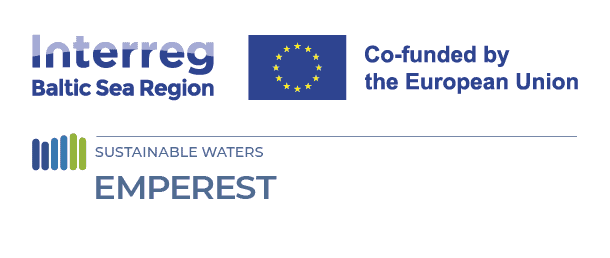
Advanced mobile technology for removing micropollutants from wastewater
28 August 2023
The mobile pilot plants that will be launched in EMPEREST will include a combination of technologies proven to have a high degradation rate of different organic micropollutants. Throughout the project, these mobile pilots will travel to 6 wastewater treatment plants in different countries to collect the data on the treatment efficiency, most efficient combination of technologies and specific conditions required for the optimal operation of the advanced treatment.
Where we are half a year into the project – get to know in the updates from the University of Tartu and the Gdańsk Water Utilities!
Mobile containers in Tartu and Gdańsk – developed in the transnational perspective
Tartu, Estonia: The mobile container project steered by the University of Tartu has been a multi-faceted endeavour involving extensive research. This includes the collection and interpretation of data, and discussions on the applicability of monitoring various aspects of PFASs (Per- and polyfluoroalkyl substances), such as their physicochemical properties and distribution methods. In addition to in-depth internal discussions, extensive collaboration was held with other research partners and stakeholders to pool insights and best practices for design and tendering of a practical and effective mobile pilot plant.
Gdańsk, Poland: The development of the concept of advanced mobile pilot plant for organic micropollutants removal began in mid-2022 with the review of scientific literature and gathering useful and valuable information on experience related to operation of micropollutant removal systems. Based on the collected information, a proposal for the sequence of unit processes and technical parameters of individual pilot plant components was developed, including pump capacity, tank volume, ozone system capacity, filter surface area and height, and UV lamp performance. After the constructive discussions within the EMPEREST project team, a final detailed concept of the pilot installation was agreed on. The final concept was included in the tender documentation for the construction of the pilot plant.
Selected technologies for eliminating micropollutants
When it comes to treating wastewater for micropollutants, the approach selected by EMPEREST project blends a variety of techniques including filtration, ozonation, the use of granulated activated carbon, and UV-disinfection. These methods have been previously shown to be good candidates for quaternary wastewater treatment and will be tested in the concept of the pilot plant.
During the initial phase, technical designs and specifications for the pilot device were jointly developed by University of Tartu and the Technical University of Berlin, as well as practical operators of wastewater treatment facilities from Estonia, Poland, and Finland. As a result, Tartu Waterworks and Gdańsk Water Utilities have succeeded with the public procurements for these mobile containers, with plans to launch them in early 2024.
Detecting and eliminating water borne organic micropollutants, including PFASs, is a complex task. These substances are present in trace amounts but are stubbornly persistent and tend to accumulate in biological systems and water ecosystems. It’s definitely challenging and engaging to identify these substances from the effluent samples of the wastewater treatment plants via water analyses and demonstrate their removal from the actual treatment plant effluents.
Next steps
Now that the procurements are finalised, there is a lot of work ahead related to determining specific technical and operational details. Many of them will need to be discussed with the contractors and determined on an ongoing basis during the construction works.
In the following weeks, the design concept of the pilot plants will be submitted, and the construction will begin.
With the plans to launch the mobile pilot plant in early 2024, the first pilot tests will be conducted in Gdańsk and Tartu in spring, when the weather conditions are favourable. After approximately 3 months of operation, including collecting wastewater samples for laboratory measurements, adjusting technological parameters and evaluating process performance, the plan is to move the mobile plants to the next locations – to Szczecin and Tallinn respectively, to conduct similar pilot tests and continue building a strong data basis for further work.
Written by:
Taavo Tenno, Siiri Velling (University of Tartu)
Marek Swinarski (Gdańsk Water Utilities)





